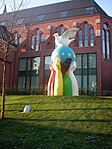Rue de la Loi

The Rue de la Loi (French) or Wetstraat (Dutch), meaning "Law Street", is a major street running through central and eastern Brussels, Belgium, which is famous due to the presence of several notable Belgian and EU governmental buildings. The road runs from the Rue Royale/Koningsstraat, in central Brussels, to the Schuman roundabout in its European Quarter. It forms the first (westerly) part of the N3 road that runs to Aachen, Germany. The terms Rue de la Loi in French or Wetstraat in Dutch are used metonymically for government in Belgian politics and media because the Belgian Federal Parliament building (Palace of the Nation) stands at the beginning of this street and the office of the Prime Minister is located adjacent to this building, at number 16. It is also where the Council of Ministers holds its meetings. At the far end, next to the Schuman roundabout, are the Berlaymont building of the European Commission, the Europa building of the European Council and Council of the European Union, and the Parc du Cinquantenaire/Jubelpark beyond that. Shortly before the roundabout is the exit ramp from the tunnel under the roundabout and Cinquantenaire.
Excerpt from the Wikipedia article Rue de la Loi (License: CC BY-SA 3.0, Authors, Images).Rue de la Loi
Rue de la Loi - Wetstraat, City of Brussels
Geographical coordinates (GPS) Address Phone number Website Nearby Places Show on map
Geographical coordinates (GPS)
| Latitude | Longitude |
|---|---|
| N 50.844166666667 ° | E 4.3752777777778 ° |
Address
DG ECHO
Rue de la Loi - Wetstraat 86
1000 City of Brussels (Brussels)
Belgium
Open on Google Maps









